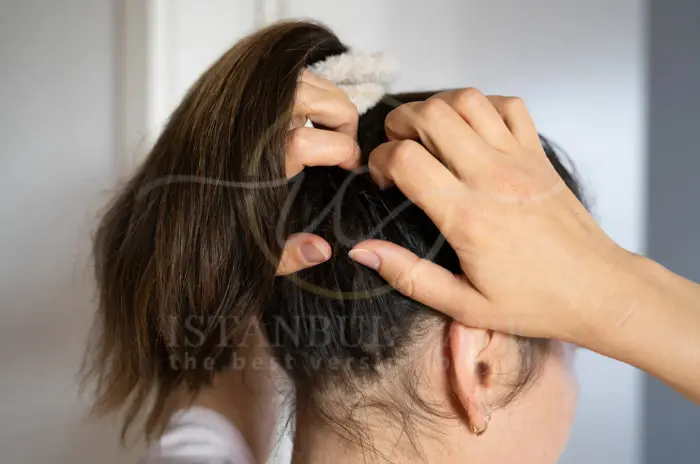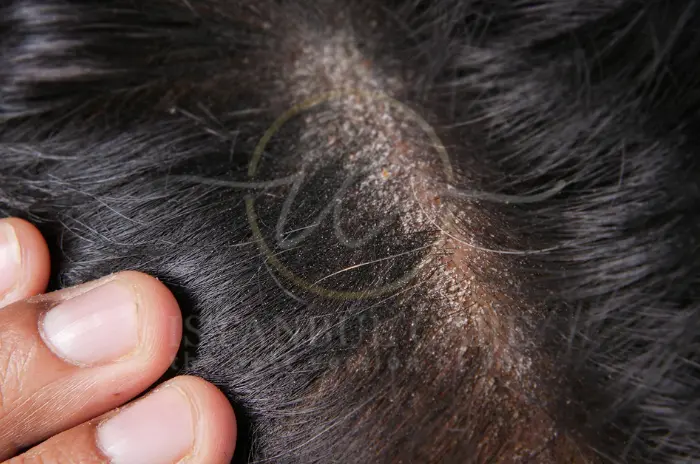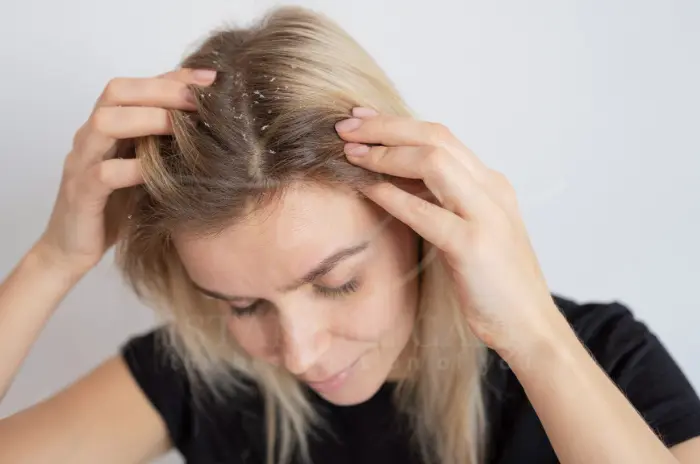A dry scalp can be an uncomfortable condition that affects millions of people worldwide, and learning how to fix dry scalp is essential. Unlike other scalp conditions, it typically presents with tightness, itching, and small white flakes. Understanding the root causes and implementing the right care routine can help restore your scalp's natural moisture balance and eliminate discomfort.
This comprehensive guide will walk you through everything you need to know about identifying, treating, and preventing dry scalp. From distinguishing it from dandruff to exploring effective treatments, you'll discover practical solutions for achieving a healthier, more comfortable scalp.

What Is Dry Scalp and How It Differs from Dandruff
Many people confuse dry scalp vs dandruff, but these are distinct conditions requiring different treatments. A dry scalp occurs when your skin lacks sufficient moisture and natural oils, leading to tightness and irritation. The flakes produced are typically small, dry, and white in appearance.
Seborrheic dermatitis dandruff, on the other hand, results from excess oil production and yeast overgrowth. The flakes associated with dandruff are usually larger, yellowish, and oily in texture. Dandruff often appears with redness and inflammation, while dry scalp primarily causes itching and tightness.
Understanding this difference is crucial because using anti-dandruff products on a dry scalp can actually worsen the condition. Anti-dandruff shampoos may strip away the little moisture your scalp has left, intensifying dryness and irritation.
What dry scalp is and common symptoms
A dry scalp manifests through several recognizable symptoms. The most common sign is persistent itchy scalp and flaking, where you feel the constant urge to scratch. This itching often worsens after washing your hair or in low humidity environments.
The hallmark symptom is small, white flakes that fall from your hair. Unlike dandruff flakes, these are dry and powdery rather than oily. You may also experience tightness across your scalp, similar to dehydrated facial skin.
Other symptoms include redness or irritation in specific areas, increased sensitivity when touching your scalp, hair that appears dull, and scalp skin that feels rough. Some individuals with severe dry scalp may develop small cracks in the skin. If symptoms persist for more than two weeks despite home care, consider professional evaluation.
Main causes of dry scalp products weather and age
Understanding dry scalp causes is essential for effective treatment. Environmental factors play a significant role, with cold weather being a primary culprit. Winter air has low humidity levels, which strip moisture from your scalp. Indoor heating systems further exacerbate this problem.
Hair care products can be major contributors. Shampoos containing sulfates, alcohol, and artificial fragrances strip your scalp of natural oils. Contact dermatitis scalp reactions occur when your skin becomes irritated by specific ingredients, leading to inflammation and moisture loss.
Age is another important factor. As we get older, our skin produces less sebum, the natural oil that keeps our scalp moisturized. This natural decline can begin as early as your 30s and continues throughout life.
Additional causes include overwashing your hair, using hot water during washing, frequent heat styling tools, nutritional deficiencies in omega-3 fatty acids and zinc, and certain medical conditions like eczema or psoriasis.
Medical Conditions Affecting Scalp Health
Several medical conditions can present with dry scalp symptoms. Scalp psoriasis causes thick, silvery scales and can be an extremely itchy scalp condition requiring specialized treatment. Cradle cap affects infants, creating yellowish, crusty patches.
Tinea capitis scalp ringworm is a fungal infection causing scaling and hair loss. Actinic keratosis scalp develops from sun damage and appears as rough, scaly patches. Each condition requires specific medical intervention beyond standard dry scalp treatment approaches.
If you experience severe symptoms, patchy hair loss, or scalp changes that don't improve with home care, consulting a dermatologist is essential.
Prevention tips for an itchy dry scalp
Preventing dry scalp is often easier than treating an established condition. Start by adjusting your hair washing routine. Reduce washing frequency to 2-3 times per week, and always use lukewarm rather than hot water. Hot water removes more oil than necessary.
Choose a gentle moisturizing shampoo specifically formulated for dry or sensitive scalps. Look for products free from sulfates, parabens, and artificial fragrances. Natural ingredients like aloe vera, coconut oil, and shea butter provide moisture without irritation.
Environmental protection is crucial. During winter months, wear a hat made from natural fibers to protect your scalp. Use a humidifier in your home to maintain optimal moisture levels, especially in bedrooms.
Daily Scalp Care Habits
Establishing a consistent scalp care routine can prevent dryness. Massage your scalp gently for 5 minutes daily to stimulate blood circulation and distribute natural oils. Avoid scratching even when experiencing mild itching, as this damages the skin barrier.
Stay hydrated by drinking at least 8 glasses of water daily. Internal hydration reflects in your skin and scalp health. Include foods rich in omega-3 fatty acids like salmon, walnuts, and flaxseeds to support healthy oil production.
Limit heat styling tool usage and always apply heat protectant. The high temperatures from blow dryers and flat irons can dehydrate your scalp. Air drying whenever possible is the gentlest option for both hair and scalp health.

Best Treatments for Scalp Psoriasis and Itchy Scalp
When dealing with conditions like scalp psoriasis, specialized treatments become necessary. Phototherapy for scalp psoriasis uses controlled ultraviolet light exposure to reduce inflammation and slow skin cell turnover. This treatment requires multiple sessions in a dermatologist's office.
Medicated shampoos play a crucial role. Selenium sulfide shampoo helps control both dandruff and mild psoriasis by reducing yeast levels and slowing skin cell production. Use it 2-3 times weekly, leaving it on for 5-10 minutes before rinsing.
Salicylic acid shampoo works as a gentle exfoliant, removing dead skin cells and reducing scaling. It's particularly effective for flaky scalp conditions and can be alternated with moisturizing shampoos for balanced care.
Medical Interventions and When to Seek Help
For fungal infections like tinea capitis scalp ringworm, antifungal treatment for scalp is essential. Oral antifungal medications are typically prescribed for 6-8 weeks, as topical treatments alone rarely penetrate deeply enough.
Knowing when to see a dermatologist for dry scalp can prevent complications. Schedule an appointment if you experience severe itching disrupting sleep, visible hair loss or thinning patches, scalp bleeding from scratching, symptoms persisting beyond 4 weeks of home treatment, or signs of infection like warmth and swelling.
How to treat a dry scalp at home with gentle shampoo
Home remedies for dry scalp can be remarkably effective when used consistently. Natural oils provide deep moisturization without chemicals. Coconut oil has antimicrobial properties and penetrates effectively. Warm 2-3 tablespoons of organic coconut oil, massage into your scalp, and leave for 30 minutes before washing.
Aloe vera gel offers soothing relief for itchy scalp symptoms while providing hydration. Apply pure aloe vera gel directly to your scalp, leave for 20 minutes, then rinse with cool water. For added benefits, mix with tea tree oil.
An apple cider vinegar rinse can restore your scalp's pH balance. Mix equal parts water and apple cider vinegar, apply after shampooing, massage gently, and rinse after 5 minutes. Use once weekly.
Creating Your Scalp Treatment Routine
Building an effective dry scalp treatment routine requires consistency. Begin with a gentle moisturizing shampoo that cleanses without stripping. Follow with a hydrating conditioner applied primarily to hair ends.
Weekly deep conditioning treatments provide intensive moisture. Apply a thick hair mask to your scalp and hair, cover with a shower cap, and leave for 15-30 minutes.
| Treatment Type | Frequency | Expected Results |
|---|---|---|
| Moisturizing Shampoo | 2-3 times weekly | Reduced dryness within 1-2 weeks |
| Oil Treatments | Once weekly | Improved hydration after 3-4 applications |
| Aloe Vera Gel | 2-3 times weekly | Soothing relief immediately |
| ACV Rinse | Once weekly | Better pH balance in 2 weeks |
Professional Hair Care Product Selection
Choosing the best shampoo for dry scalp involves reading ingredient labels carefully. Avoid products containing sodium lauryl sulfate (SLS), as these harsh cleansers strip natural oils. Look for gentler surfactants like cocamidopropyl betaine.
Beneficial ingredients for dry scalp include hyaluronic acid for moisture retention, glycerin for hydration, and ceramides for barrier repair. Botanical extracts like chamomile and oat extract provide anti-inflammatory benefits.
For hair care overall, complement your scalp treatment with products that support moisture retention. Leave-in conditioners, hair oils, and serums help seal in hydration and protect against environmental stressors.
We’re ready to answer your questions
Dry scalp produces small, white, dry flakes from lack of moisture, while dandruff causes larger, oily, yellowish flakes from excess oil and yeast overgrowth.
Yes, shampoos with sulfates, alcohol, and artificial fragrances strip natural oils and can cause contact dermatitis, leading to severe scalp dryness.
Coconut oil treatments, aloe vera gel, apple cider vinegar rinses, and using gentle moisturizing shampoos effectively treat dry scalp at home.
Cold air and indoor heating reduce humidity levels, stripping moisture from your scalp and causing seasonal dryness and irritation.
Follow us on social media for updates, tips, and patient success stories:

